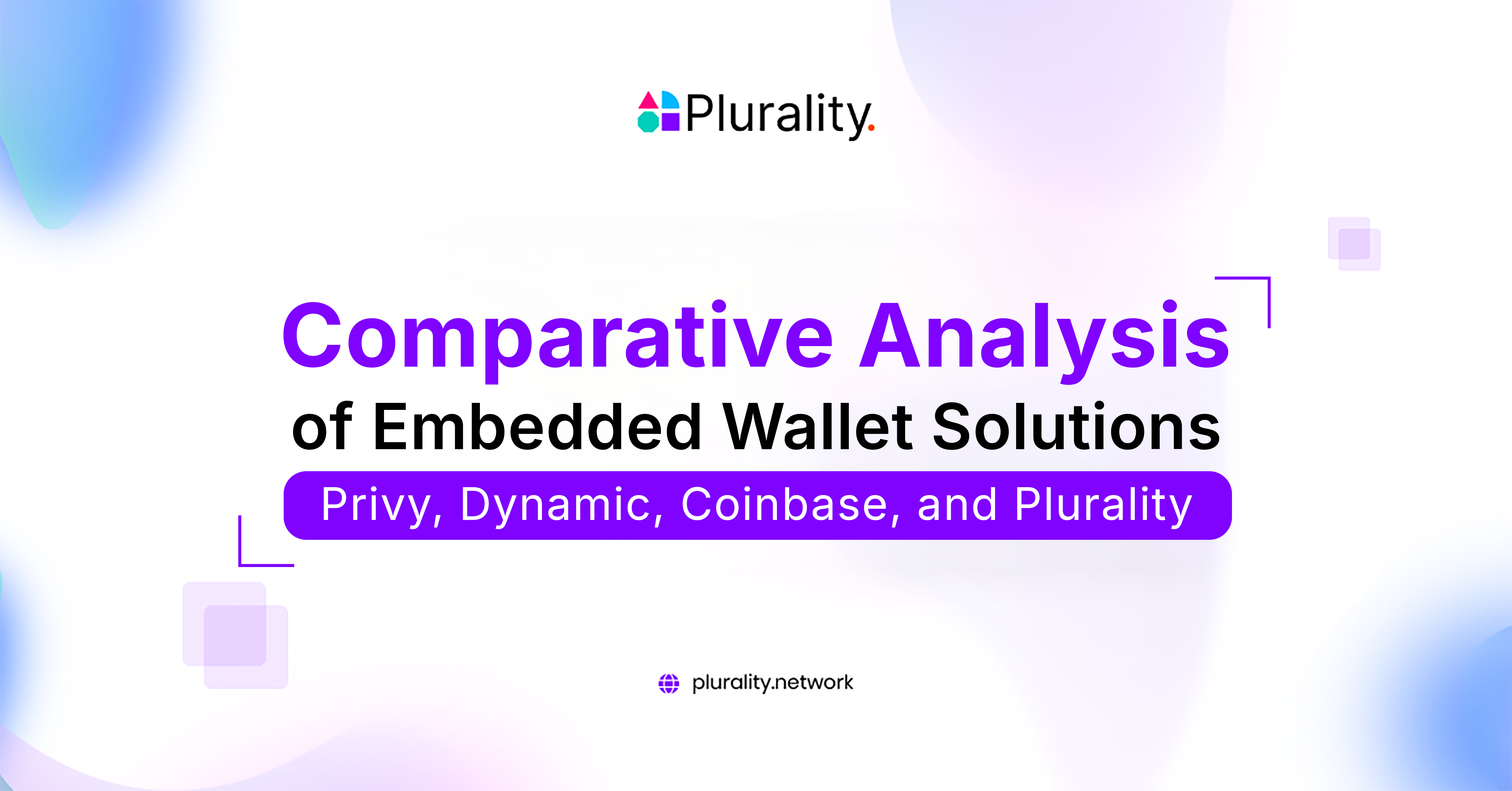Comparative Analysis Of Embedded Wallet Solutions: Privy, Dynamic, Coinbase, and Plurality
By Alev • April 25, 2025

The embedded wallet race is heating up, with key debates focusing on utilities and features like personalization, security, Agentic AI integration, and user-friendly UX to attract even Web3 beginners. DApp owners and developers seek embedded wallets that provide strong protection in this ecosystem and can work efficiently with their dApps. Users only care about one thing: their valuables stay safe and secure.
The market is buzzing, with key players like Privy, Dynamic, Coinbase, and Plurality all vying for dominance. But beyond the hype, serious questions demand answers. What truly differentiates these embedded wallet solutions?

We must dissect their core architectures and understand the nuances that set them apart. Furthermore, the paramount concern for any user is security. What level of protection do these solutions provide against the threats?
What are Embedded Wallets?
Embedded wallets are cryptocurrency wallets that are seamlessly integrated into decentralized applications (dApps) or Web3 platforms. Unlike traditional web3 wallets that require separate applications or browser extensions (such as MetaMask), embedded wallets like Plurality operate within the app itself, providing users with a frictionless experience
Embedded wallets help users interact with the functionalities of blockchain apps without needing an external wallet application. This approach maximizes user experience by providing easy access to decentralized applications (dApps) and services within a familiar interface.
As there are many embedded wallet solutions in the blockchain space, we will explore some of the leading embedded wallet providers, including Privy, Dynamic, and Coinbase, and compare their features, security measures, and blockchain support against Plurality. By assessing these solutions side by side, we aim to highlight their strengths and weaknesses, as well as how they cater to different Web3 use cases.
Privy’s Embedded Wallet
Privy is a developer-friendly embedded wallet solution designed for seamless integration and user accessibility through a privacy-preserving identity and key management layer. With a low-code approach, it enables quick deployment for EVM chains and Solana, eliminating the need for external wallets. By prioritizing ease of use and security, Privy enhances blockchain interactions, making Web3 more intuitive. But how does it compare in terms of security, blockchain support, and usability? Let’s dive in.
Features and integration
Privy offers a straightforward, almost no-code way for developers to add embedded wallets for Ethereum-based blockchains and Solana. This means less hassle and faster integration, saving valuable development time. Their approach puts the user first, making it super simple to start using dApps without the usual headache of installing separate wallets. In short, Privy’s embedded wallet provides:
- Low-code interface for easy integration.
- Supports EVM chains and Solana.
- Focused on reducing friction for developers and end users.
Security Measures
Privy takes security seriously, employing advanced encryption and a clever way of handling your private keys. Think of it like this: your secret key isn’t kept in one place. Instead, it’s broken down using cryptographic techniques, so no single server holds the whole key. This smart design means you can hop onto your wallet from different gadgets without compromising security.
Key security measures include:
- Self-Custody with Key Sharding: Users retain control over their keys, which are protected through secure splitting methods.
- Multi-Factor Authentication (MFA): Enhanced account protection using passkeys, time-based one-time passwords (TOTP), and SMS verification.
- Isolated Execution Environments: Sensitive operations occur within browser-enforced iframes and server-side Trusted Execution Environments (TEEs), providing maximum protection.
- Encrypted Data Storage: All sensitive data is encrypted at rest, ensuring it remains secure even in the event of a breach.
- Robust Key Recovery: Users have access to secure recovery options, both automated and user-managed.
- Continuous Security Monitoring: Regular audits and bug bounty programs are in place to identify and mitigate vulnerabilities.
With its layered security architecture, Privy effectively mitigates risks associated with server-side storage while maintaining user control and privacy.
Blockchain Support
Privy’s reach across the blockchain world is pretty broad, supporting EVM-compatible chains plus Solana. That hits a big chunk of the action. However, if you’re building on something completely different, not in that EVM or Solana family, then you’d need to explore other wallet options.
Dynamic Embedded Solution
Dynamic is making Web3 easier for everyone with their embedded wallets. They’ve built a smooth way for crypto pros to log in and a super simple way for newbies to get started. Plus, they handle all the account management in one place. It’s all about making using Web3 apps feel natural and hassle-free.
Features and Integration
Dynamic provides a comprehensive SDK that unifies authentication, smart wallets, and secure key management, with broad multi-chain support across various blockchain networks and third-party wallets. Its Identity and Access Management features include access lists, NFT gating, and identity integrations, enabling developers to control and customize user access. The platform also supports multi-wallet functionality, allowing users to manage multiple wallets within a single account for greater flexibility. Additionally, developers can leverage React Native SDKs, customizable UI components, and support for account abstraction through ZeroDev.
- Custom Wallet Connectors: Developers can add custom wallet connectors to the Dynamic SDK, allowing for greater flexibility and customization in integrating wallets that may not follow standard protocols or have unique requirements.
- Partner Ecosystem: Collaborations with technology providers like Caldera, Station, and Superform enhance the platform’s capabilities.
These features and integrations position Dynamic as a versatile solution for developers aiming to create secure, user-friendly, and feature-rich applications in the decentralized web space.
Security Measures
Dynamic emphasizes strategic user-centric security measures and extensive blockchain support for both developers and users to ensure a secure and versatile experience:
- Threshold Signature Scheme with Multi-Party Computation (TSS-MPC): Dynamic’s embedded wallets utilize TSS-MPC technology, which distributes key generation and signing processes among multiple parties. This approach enhances security by eliminating single points of failure and ensuring that private keys are never fully reconstructed on a single device.
- Multi-Factor Authentication (MFA): Dynamic supports additional security layers beyond passwords, such as passkeys, time-based one-time passwords (TOTP), and SMS verification, to enhance account protection.
- Secure Key Storage: Advanced cryptographic solutions safeguard private keys from unauthorized access, ensuring that sensitive information remains protected.
- Transaction Signing and Review: Users can verify transactions before approval, enhancing trust and security.
Security Settings Configuration: Dynamic allows developers to configure security features such as Cross-Origin Resource Sharing (CORS) origin URLs and JSON Web Token (JWT) expiration times, providing control over security policies.
Blockchain Support
Dynamic supports a wide range of blockchains, making it easy for developers to integrate, manually or via the Dynamic dashboard, with both EVM-compatible networks like Ethereum and non-EVM chains such as Solana and Bitcoin.
Coinbase
The Coinbase Developer Platform (CDP) offers a comprehensive suite of tools and APIs designed to facilitate the development of on-chain applications, catering to both individual developers and institutions.
Key Features
- Wallet SDK: Enables seamless integration of the Coinbase Wallet into decentralized applications (dApps), supporting multiple blockchain networks and enhancing the user experience.
- Onramp API: Allows users to convert fiat currency to cryptocurrency effortlessly, simplifying the onboarding process for new crypto users.
- Paymaster: Facilitates gasless transactions, enabling users to interact with blockchain applications without the need to hold native tokens for gas fees.
- OnchainKit: Provides ready-to-use components and TypeScript utilities, expediting the development of on-chain applications.
- Data API: Offers free access to on-chain data, empowering developers with insights necessary for building data-driven applications.
Security Measures
Coinbase, for one, accords its reputation with its very strong and tight security implementation, multi-factor authentication, and the use of high-grade types of encryption. The Smart Wallet also boringly leverages these to hell and back to ensure that your assets are safe while providing an incredible, seamless user experience.
- Self-custody: Users directly control their private keys.
- Advanced features: Biometric and password protections secure access.
- Transaction checks: Previews and alerts prevent unauthorized spending.
- DApp protection: Blocklists and permissions limit malicious interactions.
- Hardware support: Ledger integration provides offline key storage.
- MPC: Key splitting distributes risk for enhanced security.
Blockchain Support
Coinbase’s Smart Wallet operates well with many blockchain networks, like Arbitrum, Avalanche, and the main Ethereum network. This wide support means developers can easily build for the blockchains they like best, making their apps work across different crypto worlds without much hassle.
Plurality Network
Web3, despite its potential, remains largely inaccessible to the global population. This is primarily due to the intricate onboarding processes and the difficulty users face in discovering relevant content after joining, also known as the ‘cold start’ problem. Plurality Network addresses these critical challenges by revolutionizing the Web3 user experience. The features of our core Plurality Network protocol are:
- Frictionless Onboarding (Web2 Simplicity): Complete abstraction of Web3 complexities. Users interact with a familiar, intuitive interface, eliminating the need to understand underlying blockchain mechanics. One-click onboarding, minimizing steps, and maximizing user engagement from the start. Not just that, dApp developers can enjoy customizable onboarding for their dApps based on unique needs.
- Smart Profiles (Beyond Wallets): Cryptographically secured profiles that link identity to wallet for seamless, chain-agnostic logins. User-controlled data and portability of information across different applications. Profiles become the central point of interaction, simplifying user journeys across multiple dApps.
- Personal Agents (AI-powered personalization): AI-driven agents that learn user preferences and automate complex wallet tasks. Proactive recommendations and personalized content delivery, solving the ‘cold start’ problem. Automated transaction management based on pre-set user parameters. Context-aware recommendations for applications and services.
- Social SDK (Connecting Social and Financial Capital): Access to user social graphs for targeted engagement and community building. Seamless integration of social actions within dApps, fostering a more interactive and engaging experience. Social reputation and influence can be utilized within financial applications. Tools for developers to create social-first applications.
Customizable Onboarding & Unified Profiles: Plurality offers low-code integration with flexible onboarding flows, along with data-rich user profiles that aggregate identity and activity data from both Web2 and Web3 sources. See how it works.
Security Measures
Plurality implements strong security measures, which consist of encryption and multi-factor authentication to aid in safeguarding the assets of its users. Plurality’s embedded wallet security focuses on:
- Decentralized MPC-TSS Network: Plurality wallets are powered by the Lit Protocol, a decentralized MPC-TSS network. This differs from Privy and Dynamic, which do not use decentralized MPC-TSS for key management.
- Multi-Factor Authentication: Wallets include built-in multi-factor authentication for enhanced security.
- Encrypted Decentralized Data Storage: User data is encrypted and stored using secrets generated through the MPC network, ensuring privacy and resistance to centralized breaches.
- Minimized Attack Surface: Consolidating wallet access and securing keys through MPC reduces exposure to potential threats.
- Developer Security Tools: Secure SDKs and integration tools are available to help developers build with confidence.
- Forward-Looking Architecture: Ongoing work on wallet and chain abstraction ensures long-term security and scalability.
Blockchain Support
Plurality supports a wide range of both EVM and non-EVM blockchains, allowing users to manage diverse assets through a single smart profile. This broad compatibility helps users build a well-rounded portfolio while enjoying a simplified and seamless Web3 experience.
Quick Comparison Of Embedded Wallets
When comparing embedded wallets from Privy, Coinbase, Dynamic, and Plurality, each offers unique strengths in security, blockchain support, and developer experience. The following analysis highlights the feature differences between these wallets and what makes Plurality the first choice for developers of Web3 applications. In short, here is what we have learned so far:

Conclusion
The right embedded wallet solution for your application depends on specific characteristic factors, such as desired blockchain support, security considerations, and integration complexity. Where Privy and Dynamic boast relatively weak blockchain support levels but are quite strong on ease of use, Coinbase comes with very wide network compatibility and strong security.
But it is Plurality that really emphasizes and underscores a unified wallet experience for users who come in contact with various blockchains. When choosing the right wallet solution for your dApps, consider all the discussed factors. So, who are you partnering with?



